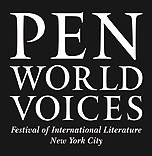NBCC member Leora Skolkin-Smith sent this report on the conversation between Adam Gopnik and new Nobel laureate J.M. Clézio, a prelude to the PEN World Voices Festival running April 27 through May 3 in New York City.
Last Friday night, people lined up in two parallel opposites lines at the 92nd Street Y Theater to hear Adam Gopnik interview the sandy-haired, handsome French writer , J.M. Clezio in his first US appearance since he won the Nobel Prize. Le Clézio, who lives in Albuquerque, New Mexico, was born in the French city of Nice, during the Italian occupation of World War II. His paternal and maternal family roots were originally from the Morbihan on the west coast of Brittany. He was raised as a small boy in Roquebillière, a small village near Nice in Italian-occupied France. In 1948, his mother took him and his brother to live with his father in Nigeria, a medical doctor in the British army. He has dual French and Mauritian citizenship. Intermittently, he has lived in the island called Mauritius near France for months at a time, and he considers himself both as a Frenchman and a Mauritian.
The evening was alternatively light-hearted, and serious but always natural and warm. It was hard look at this friendly, easy-going man and remember the Nobel Prize committee cited him as as being ” an author of new departures, poetic adventure and sensual ecstasy, explorer of a humanity beyond and below the reigning civilization.” It was said that Le Clézio’s Nobel lecture was an attack on the subject of “information poverty”, that is, how we have only information about poverty, but don’t know the people of that “information”. In French, the title of his lecture was “Dans la Forêt des Paradoxes”, translated as “In the forest of paradoxes. Le Clezio himself seems in a member of a similar forest. An example of a presence at once “literary” and serious, and yet unpretentious. A “literary” man who does not seem to match up with all the information we assume we have about “literary serious writers”, especially “literary European French writers”.
Le Clezio contends that we are all citizens in a mobile, nomadic world. We are not just a conglomerate of nationalities. He wishes that nature, not mankind, was the center of the universe. Paraphrasing a remark he made to Mr. Gopkin, Le Clezio is a “humanist” who believes that the ”natural world of plants and animals and earth” should be our only leaders. When asked by an audience member what his “internal landscape” might be he answered that h would most like to live in the North Pole. He has visions of “icy landscapes” in his mind, he explained.
Le Clezio creates a morally and socially conscious external and internal map of characters and places. He told Gopnik he had learned the most from Jewish New York writers, especially J.D. Salinger. He wanted all his characters to be like character in Salinger’s story “A Perfect Day for Bananafish” which he considers among the greatest short stories ever written. What one could take away from the infinite spaciousness and elegance of Le Clezio’s conversation with Adam Gopkin is the same one can take from his work—open spaces with open questions, a vast but not vacuous consciousness, and a heart filled with as much adventure as compassion. As a small boy, Le Clezio witnessed bombs hit his childhood French village. He was saved from starvation and hunger by rescuing American GI’s who threw him cans of spam and loaves of white bread from their army vehicles, chasing the Italians out of France. “Well, we can say we gave France spam and white Wonder bread and they gave us Le Clezio, not a bad deal—” joked Adam Gopkin. Le Clezio laughed, and smiled.
But he turned serious when he answered an audience question about whether he was an “activist.” “No, I am not a man of action,” he said. “What could I do? I can not defend myself even against one policeman. “ Paraphrasing, he told us: ”I thought, when I heard that the bombs hitting Iraq weighed almost 800 kilograms pounds….well, the bombs thrown at me as a boy in France were only 200 pounds. I still remember my terror…so what does a child in Iraq feel now? With that bomb weighing 800 pounds coming right towards him and his family?”Another example of how Le Clezio brilliantly selects the “details” and creates through them a burning power.
NBCC board member James Marcus’s take on the event at World Without Borders here.


